Monday, October 29 2007
Aria and Character Development
I'm in a bit of an anime rut. None of the new series have fully captured my attention (though Minami-ke is coming close). However, my stock of patience is not up to paint more little metal bits and I haven't made it to the store to purchase Portal the Orange Box. So I've gone back through the collection and am re-watching the better parts of Aria, and I've even managed to find a fansub of the recent OVA, Arietta.
One of the things I've both loved and hated about animation is trying to describe it in terms familiar to American TV viewers. I love it because it's a constant reminder of what I like about anime in the first place: it's different. While a lot of anime seems to build off of other anime in terms of genres and conventions, it's still not to difficult to find something unusual yet still fascinating. I hate it, of course, because I then have difficulty explaining to anyone outside that little circle exactly what it is I'm watching.
Aria is especially difficult to describe. It's science-fiction, although the science-fiction is merely detail, and if you're looking for a science-fiction show, this almost certainly isn't what you expected. It's got its fair share of lighthearted comedy. It's got some fantasy hidden here and there. Above all, it's a slice of life story (if you can call it a story). It's not what I thought I would enjoy. It's got no real plot, although the episodes are sequential and often build off of one another; it's essentially 40 filler episodes. It's got no real action; almost all the drama is of the relationship kind. Aria is a story of the day to day life of three young women who are apprentice tour guides in a rebuilt city of Venice on a terraformed Mars that's now 90% water, and what the series has is character development, often low key, but still character development.
One of my pet peeves about anime and TV in general is character development. I like to see characters and relationships progress over time. Be it in relationships or combat, the characters must learn and experience and grow to be fully human. A lot of anime, including some classics, loses this key point. The cast of Ranma 1/2 will always be stuck in the same complicated web of relationships. It's somewhat futile to watch them, as we're back to the same relationship status quo as we were at the beginning of the series. Sgt. Sousuke Sagara will always be a military blockhead cluelessly circling Kaname. Tenchi Masaki is eternally stuck between his harem of suitors.
The other thing Aria has going for it is that the world of Aqua and the city of Neo-Venezia are fully fleshed out. In part, it's because it's a tranquil setting done at a slow pace, and the animators can afford to use a still background for most of the image. But still, the animators have found the time to include unique locations in just about every episode, and the seasonal effects in some of the episodes are well done (though there are about two fall episodes in the 40 total). With the extra detail added to Aria the OVA: Arietta, it is an absolute delight to watch. There's enough color to draw the eye in general terms and enough detail that it's impossible to take in the detail in each shot.
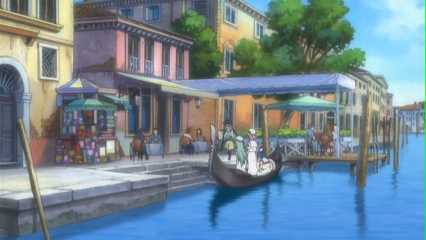
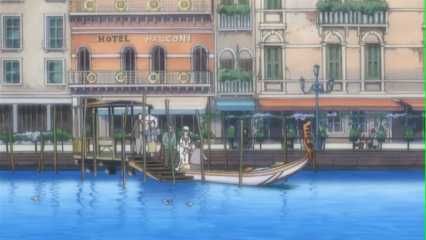
One of the things that always got me about playing a computer game, especially some of the more recent ones, is seeing the same environments reused over and over. It's another abandoned warehouse with stacks of boxes and barrels. It's another wrecked castle. It's another power station with mysterious tubes of lava. What was worse was pencil and paper RPG GMs that insisted on reusing the exact same tropes over and over again; with a pencil and paper RPG, the art budget is limitless. Animation has a fixed budget, and I know certain studios have a habit of overspending, but some animation studios frequently miss opportunities to make their worlds come alive.
Further thoughts about character development below the break. Some spoilers about character backstory, if you can consider anything in this series to be important enough to be kept secret.
Aria is primarily the story of a young woman from Earth, Akari (left, pink hair), who has gone to Neo-Venezia and has become an apprentice Undine, basically a gondolier / tour guide for the city of canals. She has been partnered with two other apprentice Undines, Aika (middle, blue hair) and Alice (right, green hair), as together they learn the ins and outs of the business, each other, and life in general.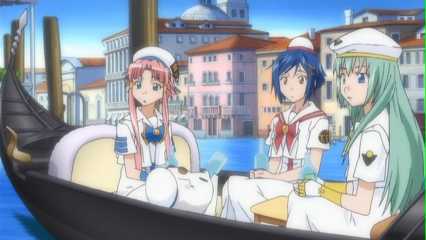
The series has a penchant for character names starting with A. Every character save one with a given name has a name starting with A. Well, every human character. The white thing with a hat in the bottom center of the picture is President Aria, a cat. In the manga, it's hinted that he's an evolved species, and he's somewhat intelligent. It's my suspicion that there are also some pygmy hippo genes in there, as well. He's somewhat akin to Snoopy, in that he thinks of himself as people and has his own occasional internal monologue. Two other cats have semi-important roles in the world of the story, for traditional reasons explained in the story.
The story mostly follows Akari around. Generally, she makes some discovery that leads her into greater insights about herself or about Aqua. Alternatively, Akari will be on hand as one of her fellow apprentices learns something about herself, or all three will learn something together. The whole bit is also somewhat sappy, but well written and often quite sentimental. It's fairly straightforward, and we watch all three grow over time as they learn to overcome their shortcomings.
Each of the three apprentices is also paired with a full-fledged Undine as mentor. Akari's mentor is Alicia, Aika's mentor is Akira, and Alice's mentor is Athena (see what I said about A's? Fortunately, hair color, uniform, and personality make it easy to distinguish which is which.) All three are regarded in the story as the most talented and professional Undines in Neo-Venezia. Akira and Athena only show up occasionally. We don't get to directly see their characters develop on screen. However, we are provided with the occasional flashback or reminiscence to see what they were like, and we can see how they have grown themselves over time.
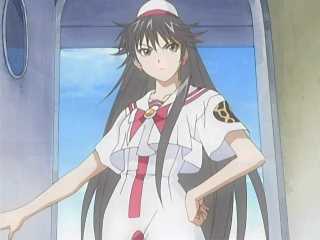
When we first meet Akira Ferrari, we are introduced to her reputation as a tough, no-nonsense instructor, determined to teach Aika and Akari to be professional. It's something of a shock, then, to see her as a rambunctious, rebellious, and adventurous to the point of danger tomboy as a kid (on the right, with Alicia on the left. It's especially amusing that I can now pick out her use of "Ore" when referring to herself.)
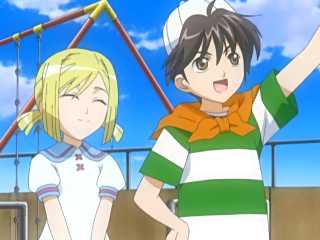
But it's a transformation that seems to flow more naturally because we have had some opportunity through other flashbacks to see Akira as an apprentice, moving between the two points (On the left, with Alicia on the right).
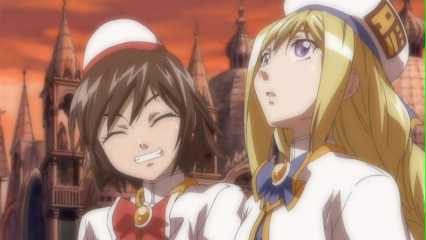
We know she's developed and grown as a person over time, and we have some idea as to why she behaves the way she behaves now. Even though she doesn't mature on screen, we can see her as a multi-dimensional character.
The cipher in the series has always been Alicia, Akari's mentor. She gets a lot more screen time than Athena and Akira, and probably as much as the other two apprentices. Yet she's always seemed one dimensional. She's always seemed a universally kind, emotionally calm older-sister figure. As a child, she's a flat caricature of her adult self. As far as we can tell, she's got no inner problems for us to latch on to.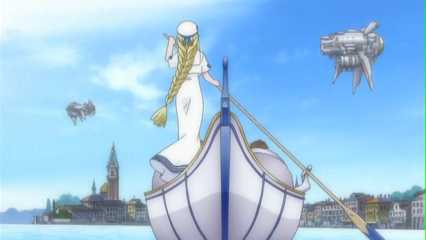
That is, at least until the OVA. Finally, we have a look at some of what she's dealt with. It's not particularly angsty, and certainly not dark at all. It was just enough for me to have some handle on her inner workings, and enough for me to see her as a multi-dimensional character.
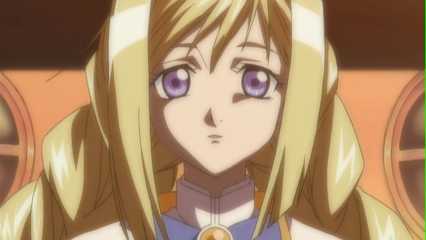
Comments are disabled.
Post is locked.
One of the things I've both loved and hated about animation is trying to describe it in terms familiar to American TV viewers. I love it because it's a constant reminder of what I like about anime in the first place: it's different. While a lot of anime seems to build off of other anime in terms of genres and conventions, it's still not to difficult to find something unusual yet still fascinating. I hate it, of course, because I then have difficulty explaining to anyone outside that little circle exactly what it is I'm watching.
Aria is especially difficult to describe. It's science-fiction, although the science-fiction is merely detail, and if you're looking for a science-fiction show, this almost certainly isn't what you expected. It's got its fair share of lighthearted comedy. It's got some fantasy hidden here and there. Above all, it's a slice of life story (if you can call it a story). It's not what I thought I would enjoy. It's got no real plot, although the episodes are sequential and often build off of one another; it's essentially 40 filler episodes. It's got no real action; almost all the drama is of the relationship kind. Aria is a story of the day to day life of three young women who are apprentice tour guides in a rebuilt city of Venice on a terraformed Mars that's now 90% water, and what the series has is character development, often low key, but still character development.
One of my pet peeves about anime and TV in general is character development. I like to see characters and relationships progress over time. Be it in relationships or combat, the characters must learn and experience and grow to be fully human. A lot of anime, including some classics, loses this key point. The cast of Ranma 1/2 will always be stuck in the same complicated web of relationships. It's somewhat futile to watch them, as we're back to the same relationship status quo as we were at the beginning of the series. Sgt. Sousuke Sagara will always be a military blockhead cluelessly circling Kaname. Tenchi Masaki is eternally stuck between his harem of suitors.
The other thing Aria has going for it is that the world of Aqua and the city of Neo-Venezia are fully fleshed out. In part, it's because it's a tranquil setting done at a slow pace, and the animators can afford to use a still background for most of the image. But still, the animators have found the time to include unique locations in just about every episode, and the seasonal effects in some of the episodes are well done (though there are about two fall episodes in the 40 total). With the extra detail added to Aria the OVA: Arietta, it is an absolute delight to watch. There's enough color to draw the eye in general terms and enough detail that it's impossible to take in the detail in each shot.


One of the things that always got me about playing a computer game, especially some of the more recent ones, is seeing the same environments reused over and over. It's another abandoned warehouse with stacks of boxes and barrels. It's another wrecked castle. It's another power station with mysterious tubes of lava. What was worse was pencil and paper RPG GMs that insisted on reusing the exact same tropes over and over again; with a pencil and paper RPG, the art budget is limitless. Animation has a fixed budget, and I know certain studios have a habit of overspending, but some animation studios frequently miss opportunities to make their worlds come alive.
Further thoughts about character development below the break. Some spoilers about character backstory, if you can consider anything in this series to be important enough to be kept secret.
Aria is primarily the story of a young woman from Earth, Akari (left, pink hair), who has gone to Neo-Venezia and has become an apprentice Undine, basically a gondolier / tour guide for the city of canals. She has been partnered with two other apprentice Undines, Aika (middle, blue hair) and Alice (right, green hair), as together they learn the ins and outs of the business, each other, and life in general.

The series has a penchant for character names starting with A. Every character save one with a given name has a name starting with A. Well, every human character. The white thing with a hat in the bottom center of the picture is President Aria, a cat. In the manga, it's hinted that he's an evolved species, and he's somewhat intelligent. It's my suspicion that there are also some pygmy hippo genes in there, as well. He's somewhat akin to Snoopy, in that he thinks of himself as people and has his own occasional internal monologue. Two other cats have semi-important roles in the world of the story, for traditional reasons explained in the story.
The story mostly follows Akari around. Generally, she makes some discovery that leads her into greater insights about herself or about Aqua. Alternatively, Akari will be on hand as one of her fellow apprentices learns something about herself, or all three will learn something together. The whole bit is also somewhat sappy, but well written and often quite sentimental. It's fairly straightforward, and we watch all three grow over time as they learn to overcome their shortcomings.
Each of the three apprentices is also paired with a full-fledged Undine as mentor. Akari's mentor is Alicia, Aika's mentor is Akira, and Alice's mentor is Athena (see what I said about A's? Fortunately, hair color, uniform, and personality make it easy to distinguish which is which.) All three are regarded in the story as the most talented and professional Undines in Neo-Venezia. Akira and Athena only show up occasionally. We don't get to directly see their characters develop on screen. However, we are provided with the occasional flashback or reminiscence to see what they were like, and we can see how they have grown themselves over time.

When we first meet Akira Ferrari, we are introduced to her reputation as a tough, no-nonsense instructor, determined to teach Aika and Akari to be professional. It's something of a shock, then, to see her as a rambunctious, rebellious, and adventurous to the point of danger tomboy as a kid (on the right, with Alicia on the left. It's especially amusing that I can now pick out her use of "Ore" when referring to herself.)

But it's a transformation that seems to flow more naturally because we have had some opportunity through other flashbacks to see Akira as an apprentice, moving between the two points (On the left, with Alicia on the right).

We know she's developed and grown as a person over time, and we have some idea as to why she behaves the way she behaves now. Even though she doesn't mature on screen, we can see her as a multi-dimensional character.
The cipher in the series has always been Alicia, Akari's mentor. She gets a lot more screen time than Athena and Akira, and probably as much as the other two apprentices. Yet she's always seemed one dimensional. She's always seemed a universally kind, emotionally calm older-sister figure. As a child, she's a flat caricature of her adult self. As far as we can tell, she's got no inner problems for us to latch on to.

That is, at least until the OVA. Finally, we have a look at some of what she's dealt with. It's not particularly angsty, and certainly not dark at all. It was just enough for me to have some handle on her inner workings, and enough for me to see her as a multi-dimensional character.

Posted by: Civilis at
08: 04 PM
| Comments (4)
| Add Comment
Post contains 1374 words, total size 10 kb.
1
"In the manga, it's hinted that he's an evolved species, and he's
somewhat intelligent. It's my suspicion that there are also some pygmy
hippo genes in there, as well."
I almost never use 'lol', but here it's appropriate, because I really did. He was rather chubby. Another webpage wondered how the girls carry him around so easily, though if they've somehow retained human strength despite Martian gravity, that could do it... but I'm probably applying too much science.
I am glad to hear that there's evidence, somewhere, of there being something to him. I knew the SF aspects were pretty shallow in this "Maria-sama without the tension" show, but I was frustrated at watching no hint as to whether he was *really* a linguistic and tool-using creature or just comic relief. I know, "real" is pretty problematic anyway, but I guess a measure would be "his human-like traits could affect the plot, if there ever was a plot." A hint of "yes, he really is a genetically engineered freakazoid" makes me feel better.
I almost never use 'lol', but here it's appropriate, because I really did. He was rather chubby. Another webpage wondered how the girls carry him around so easily, though if they've somehow retained human strength despite Martian gravity, that could do it... but I'm probably applying too much science.
I am glad to hear that there's evidence, somewhere, of there being something to him. I knew the SF aspects were pretty shallow in this "Maria-sama without the tension" show, but I was frustrated at watching no hint as to whether he was *really* a linguistic and tool-using creature or just comic relief. I know, "real" is pretty problematic anyway, but I guess a measure would be "his human-like traits could affect the plot, if there ever was a plot." A hint of "yes, he really is a genetically engineered freakazoid" makes me feel better.
Posted by: Damien at Nov 18 01 55 (IKXeV)
2
It's actually in the Aqua manga, the precursor (or prequel, not sure which) to Aria, that they specifically refer to President Aria as a "Mars Cat", and state that he's as intelligent as a human.
I can accept a sci-fi universe with artificial gravity (spacecraft, hoverbikes, flying islands, etc.) as long as they don't throw some hokey explanation as to why. In Aria, we know that it is the "Salamanders" that regulate the planets atmosphere from the floating islands, and because we don't look too closely at it, it doesn't really register as anything more than boilerplate sci-fi background and doesn't impact the realism of the setting. But the series states that a second profession, the "Gnomes" that regulate the gravity of Mars / Aqua, and we get a brief look in the anime at the workings of that technology, and it's so ludicrous that even though it's a throw away detail on screen for under a minute, it significantly ruined the realism of the setting.
Other than the tech, I've been very impressed with the realism of the setting. I went and spent some time looking at pictures of Venice, and the detail work that went in to the portrayal of some of the buildings and areas in the series is quite impressive. The animators seem to have Saint Mark's Square down perfectly, and in the Arietta OVA credits there's a bit thanking "La Procuratoria della Basilica di San Marco".
I can accept a sci-fi universe with artificial gravity (spacecraft, hoverbikes, flying islands, etc.) as long as they don't throw some hokey explanation as to why. In Aria, we know that it is the "Salamanders" that regulate the planets atmosphere from the floating islands, and because we don't look too closely at it, it doesn't really register as anything more than boilerplate sci-fi background and doesn't impact the realism of the setting. But the series states that a second profession, the "Gnomes" that regulate the gravity of Mars / Aqua, and we get a brief look in the anime at the workings of that technology, and it's so ludicrous that even though it's a throw away detail on screen for under a minute, it significantly ruined the realism of the setting.
Other than the tech, I've been very impressed with the realism of the setting. I went and spent some time looking at pictures of Venice, and the detail work that went in to the portrayal of some of the buildings and areas in the series is quite impressive. The animators seem to have Saint Mark's Square down perfectly, and in the Arietta OVA credits there's a bit thanking "La Procuratoria della Basilica di San Marco".
Posted by: Civilis at Nov 18 10 30 (Kty7/)
3
From what I've gathered, the Aqua manga is what we know as Aria, not a prequel or anything like that. The series changed from one magazine to another, and the name changed at that time, too.
Everything I've found about it seems to indicate that (talking in anime terms, and I'm making up episode numbers here) ep03 was in Magazine #1, and ep04 was in Magazine #2. Since each episode is self-contained, it could easily look like a prequel thing...
Of course, I could also be incredibly wrong. It's not like there's tons of data about it out there.
Everything I've found about it seems to indicate that (talking in anime terms, and I'm making up episode numbers here) ep03 was in Magazine #1, and ep04 was in Magazine #2. Since each episode is self-contained, it could easily look like a prequel thing...
Of course, I could also be incredibly wrong. It's not like there's tons of data about it out there.
Posted by: Wonderduck at Feb 18 20 42 (AW3EJ)
4
@Wonderduck: I'm really not sure what you're trying to say, but the fact is that ARIA is pretty much the relaunch of AQUA when it changed publishers. They do connect seamlessly (the two total volumes of AQUA cover Akari's arrival on Aqua in spring up to the end of summer, and ARIA v.1 picks up the story at the beginning of autumn of the same year), so if you are reading the manga, it would be best to start with all of AQUA first.
I can only presume that the ARIA name is better known because the story has been running under that name longer (ARIA will be wrapping up with the 12th volume very soon).
I can only presume that the ARIA name is better known because the story has been running under that name longer (ARIA will be wrapping up with the 12th volume very soon).
Posted by: StarCreator at Feb 21 15 38 (PxGcW)
25kb generated in CPU 0.0199, elapsed 0.0335 seconds.
40 queries taking 0.0272 seconds, 97 records returned.
Powered by Minx 1.1.6c-pink.
40 queries taking 0.0272 seconds, 97 records returned.
Powered by Minx 1.1.6c-pink.









